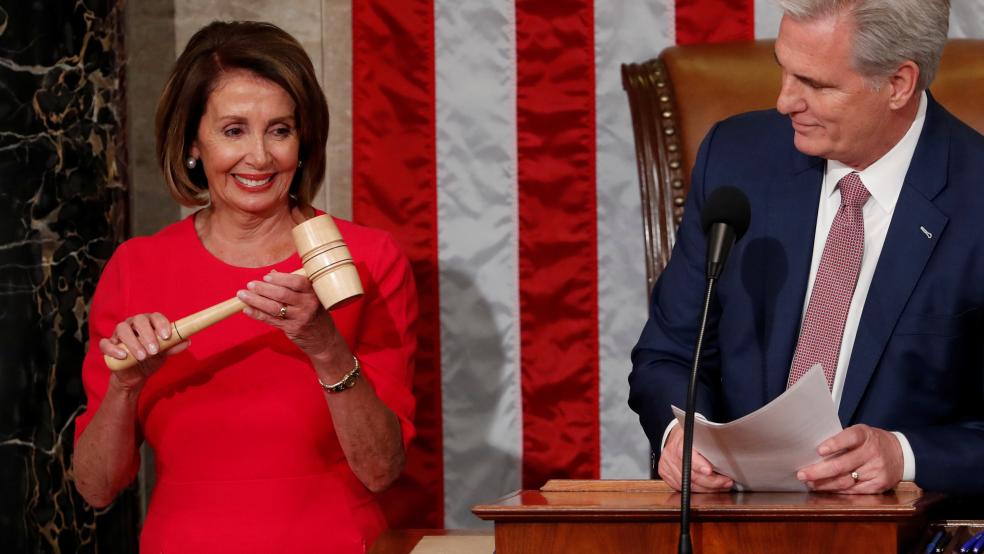As the partial government shutdown heads for its 34th day, the political brawling between President Trump and House Speaker Nancy Pelosi is revving up to new levels.
Here’s an update on where things stand:
• Pelosi Shuts Down Trump’s SOTU Speech in House Chamber: Pelosi said Wednesday that she will not allow Trump to deliver his State of the Union address from the House chamber until the government reopens. Earlier in the day, Trump said in a letter that he planned to deliver the address as previously scheduled. “I look forward to seeing you on the evening on January 29th in the Chamber of the House of Representatives,” Trump wrote. “It would be so very sad for our Country if the State of the Union were not delivered on time, on schedule, and very importantly, on location!”
In response, Pelosi said that when she invited the president on January 3 to deliver his speech in the House, “there was no thought that the government would still be shut down.” Pelosi said that “the House of Representatives will not consider a concurrent resolution authorizing the President’s State of the Union address in the House Chamber until government has reopened.” In other words, the earlier invitation has been rescinded, so don’t bother showing up on the 29th. Politico calls it “an unprecedented move that underscores how bitter partisan tensions have paralyzed Washington.”
• White House Asks for List of Programs That Will Be Hurt if Shutdown Goes Until March: Acting White House Chief of Staff Mick Mulvaney has asked agency leaders to detail the highest-impact programs that could be at risk if the shutdown drags into March and April, The Washington Post’s Damian Paletta and Juliet Eilperin report. They call that “the firmest evidence to date that the White House is preparing for a lengthy funding lapse that could have snowballing consequences for the economy and government services.”
• Senate Set to Vote on Competing Bills Doomed to Fail: The Senate will vote Thursday on two competing bills to reopen the government. One package is built around President Trump’s offer to extend legal protections for some immigrants for three years in exchange for $5.7 billion in funding for his wall on the southern border, though it also includes some provisions that would make it harder for asylum seekers to gain entry to the United States. The other is a House-passed Democratic plan to fund the government until February 8 without providing any additional wall money.
Neither bill is expected to pass, but the votes may indicate at least some movement to try to reach a resolution. “It will be the first time the Senate has stepped off the sidelines to try to end the monthlong government shutdown,” The New York Times noted.
“The key question is: which party on Thursday will suffer more defections? It’s quite plausible that a few moderates will back both bills,” The Hill said.
The other key question: What happens after both votes fail?
“Once the choreography has played out, and each side has killed the other's preferred solution, there's just a chance that a behind-the-scenes huddle among key leaders in the Democratic House and Republican Senate could figure out an escape route,” CNN’s Stephen Collinson suggests. At the same time, he writes that, “despite increasing media focus on their plight, the suffering of the stricken federal workers is not yet imposing enough political pressure on either Trump or Pelosi's Democrats to force a swift end to the shutdown.”
• House Democrats to Offer Trump More Money for Border Security – But Not a Wall: House Democrats are preparing their own answer to that “what’s next” question. They’re reportedly set to propose significantly higher spending on border security — potentially even meeting Trump’s $5.7 billion demand — just not for a wall. But they’re still insisting that Trump agree to reopen the government first. “There is serious and justified concern that this president will shut down the government every time he doesn't get his way legislatively,” House Speaker Nancy Pelosi reportedly told a Washington, D.C., meeting of the U.S. Conference of Mayors on Wednesday.
The Democratic proposal being drafted “will include border security improvements such as retrofitting ports of entry, new sensors and drones, more immigration judges and border patrol agents, and additional technology, among other measures,” The Washington Post reports.
“If his $5.7 billion is about border security, then we see ourselves fulfilling that request, only doing it through what I like to call using a ‘smart wall’,” House Majority Whip James Clyburn (D-SC) told reporters.





